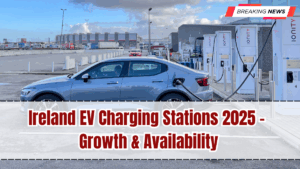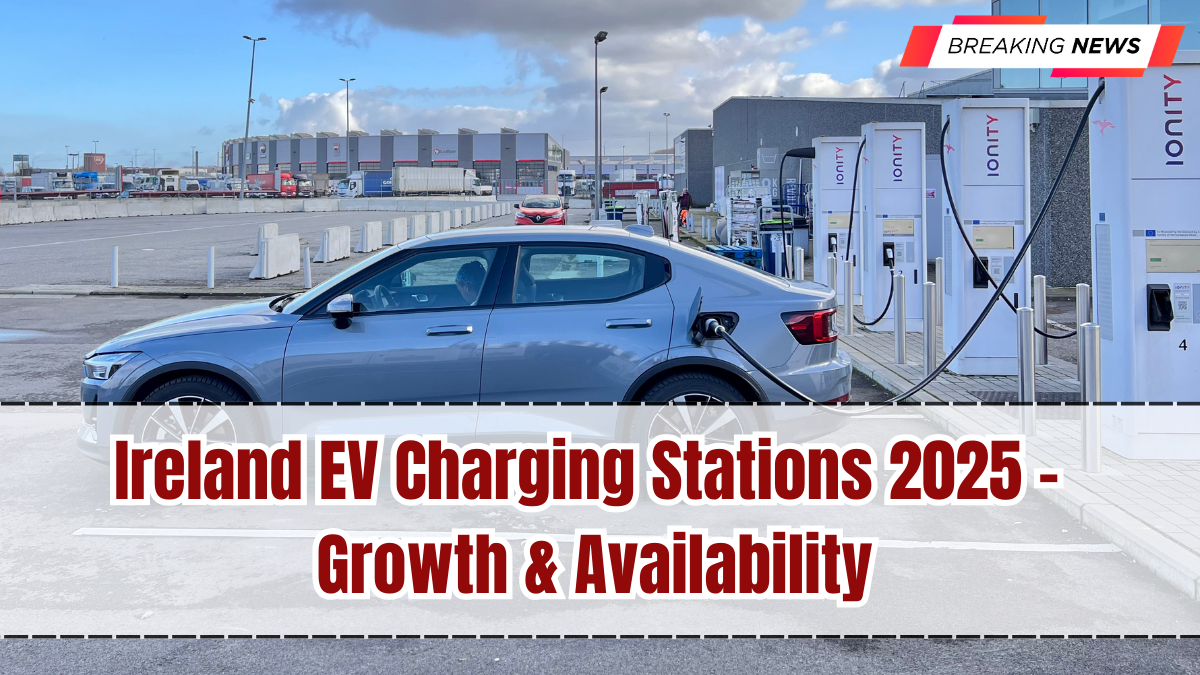The Ireland EV Charging Stations 2025 expansion marks a turning point in the country’s push toward clean transportation. With electric vehicle sales climbing rapidly, the government and private companies are investing heavily in new public charging points and fast-charging hubs.
Drivers across Ireland are witnessing a noticeable increase in charging availability, making EV adoption more practical than ever before. Combined with green energy initiatives, the network is set to transform how Irish motorists travel and refuel.
So, where are these new stations being installed, what are the costs, and how is Ireland ensuring sustainable growth for its EV future?

Why Is EV Charging Expansion Crucial in 2025?
Ireland’s EV adoption has accelerated over the last three years. Government incentives, lower running costs, and a growing variety of models have pushed sales to record highs.
However, one major barrier has always been charging infrastructure. Without enough stations, range anxiety discouraged potential buyers. In 2025, the expansion ensures EV owners can travel more confidently, whether for daily commutes or long cross-country trips.
The government’s target of 945,000 EVs on the road by 2030 relies heavily on charging station availability, making 2025 a critical year for progress.
Where Are New EV Charging Stations Being Installed?
Charging points are being added nationwide, with a focus on accessibility.
-
Motorways and highways: Fast-charging hubs now cover major routes, including the M50, M7, and M8, ensuring seamless long-distance travel.
-
Urban centers: Dublin, Cork, Galway, and Limerick are seeing a surge in curbside chargers and multi-car charging facilities.
-
Rural areas: Smaller towns and villages are receiving community-based chargers to eliminate “charging deserts.”
-
Shopping centers and workplaces: Private companies are increasingly installing chargers for employees and customers.
This wide distribution ensures that EVs are no longer just city-focused but viable nationwide.
What Types of Chargers Are Available in 2025?
Ireland’s EV charging network now offers multiple options.
-
Standard AC chargers (3–22 kW) for overnight or workplace charging.
-
Fast DC chargers (50–100 kW) for quick top-ups during errands.
-
Ultra-fast chargers (150–350 kW) that can recharge batteries to 80% in under 30 minutes.
Many new stations combine these options, giving drivers flexibility depending on their needs and time constraints.
How Much Does It Cost to Charge an EV in Ireland?
Charging costs depend on the provider, location, and charger type.
-
Home charging: Still the cheapest, averaging €0.20–€0.25 per kWh.
-
Public standard chargers: Around €0.30–€0.40 per kWh.
-
Fast chargers: Typically €0.45–€0.55 per kWh.
-
Ultra-fast chargers: Can reach €0.60–€0.70 per kWh for rapid convenience.
Government subsidies and smart-charging programs help offset these costs, especially during off-peak hours when electricity is cheaper.
How Is Green Energy Integrated Into Charging Stations?
Sustainability is at the heart of Ireland’s EV push.
Many new charging stations are powered by renewable energy sources, particularly wind and solar. Some hubs feature on-site solar panels, while others are linked directly to Ireland’s growing wind farms. Energy storage systems are also being introduced to balance supply and demand.
This ensures that EV adoption doesn’t just reduce tailpipe emissions but also contributes to Ireland’s renewable energy targets.
How Are Private Companies Supporting the Expansion?
Private companies are playing a huge role in scaling the network.
Firms like ESB ecars, Ionity, and EasyGo are investing in ultra-fast charging hubs along major routes. Retailers, supermarkets, and workplaces are also adding chargers to attract customers and support employees with EVs.
Car manufacturers, including Tesla, continue to expand their Supercharger network, which is gradually opening up to non-Tesla vehicles, adding even more charging options.
What Challenges Remain for EV Charging in 2025?
Despite progress, challenges persist.
Rural coverage, while improving, still lags behind urban areas. Charging queues are common during peak travel periods, especially at motorway hubs. Costs for ultra-fast charging remain high, discouraging budget-conscious drivers.
Additionally, the rollout of smart payment systems and interoperability between networks needs improvement, as drivers still juggle multiple apps and accounts for access.
What Does the Future Look Like for EV Charging in Ireland?
The future is promising. By 2030, Ireland plans to install 30,000 public charging points, ensuring every driver has convenient access. The growth of smart grids, renewable-powered hubs, and wireless charging technology will further enhance convenience.
Autonomous charging robots and vehicle-to-grid (V2G) systems are also being tested, allowing EVs to supply energy back to the grid during high demand periods. These innovations will position Ireland as a leader in green mobility.
Conclusion
The Ireland EV Charging Stations 2025 expansion is a major milestone in Ireland’s journey toward a sustainable transport system. With more charging points, faster options, and green energy integration, EV adoption is becoming more practical and appealing than ever.
For Irish drivers, the message is clear: the EV future is not just coming—it’s already here, with the infrastructure to support it growing stronger every day.
FAQs
How many EV charging stations are available in Ireland in 2025?
Thousands of public chargers are now installed nationwide, with major growth along motorways and urban centers.
How much does it cost to charge an EV publicly?
Costs range from €0.30/kWh for standard chargers to €0.70/kWh for ultra-fast charging.
Are rural areas covered by EV charging stations?
Yes, though coverage is still expanding, with more stations planned in small towns and villages.
Do charging stations use renewable energy?
Yes, many hubs are powered by wind and solar energy, supporting Ireland’s green goals.
Who are the major charging providers in Ireland?
ESB ecars, Ionity, EasyGo, and Tesla Superchargers lead the market.
Click here to know more.
